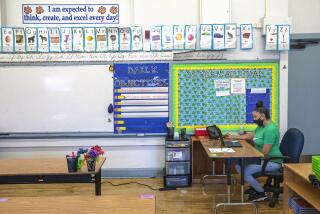Kids and Computers: Power Up?
- Share via
A recent conference on children and computers raised issues that should concern every responsible official, educator and parent. For if one thing is clear about the information superhighway--and little else is clear--it is that the computer revolution isn’t going to go away. Neither, of course, is society’s solemn obligation to educate its children as best it possibly can.
Titled “Children and the Information Superhighway,” the conference was co-sponsored by the advocate organization Children Now and the UCLA Center for Communication Policy. Foremost among the conferees’ concerns was the question of equity: Will the children of parents who cannot afford the new technology be denied an on-ramp to the information highway? And how about schools that do not have the wherewithal to link up to the Internet (the so-called information highway), much less purchase the technology? Would it not be better, as the Children’s Partnership puts it, “if children in a low-income neighborhood with precious few library books could use a modem-equipped computer and access all the resources of the Library of Congress?”
The good ideas--and the worries--don’t stop there. One estimate of the cost to wire up all of America’s public schools and libraries by the year 2000 is $28 billion. Actually, that’s doable--indeed, aggressive public policy could achieve a lot of the public-domain internetting by requiring concessions from the private sector in return for regulatory relief.
The much harder question is this: Even if every single classroom and library were plugged into the information highway, would students be better off? The amazing computer revolution has not fully answered the content question.
The profitable lines of entertainment software typically still are far more sophisticated and engaging than educational software. In the market-driven world of software development, companies usually are involved only to the degree they can profit--not an ignoble goal but not the only possible goal for America.
Given the situation, it must be asked: What, realistically, is the future of educational software? What if almost everyone had a computer but much of what kids could run on it was little more than sophisticated junk?






